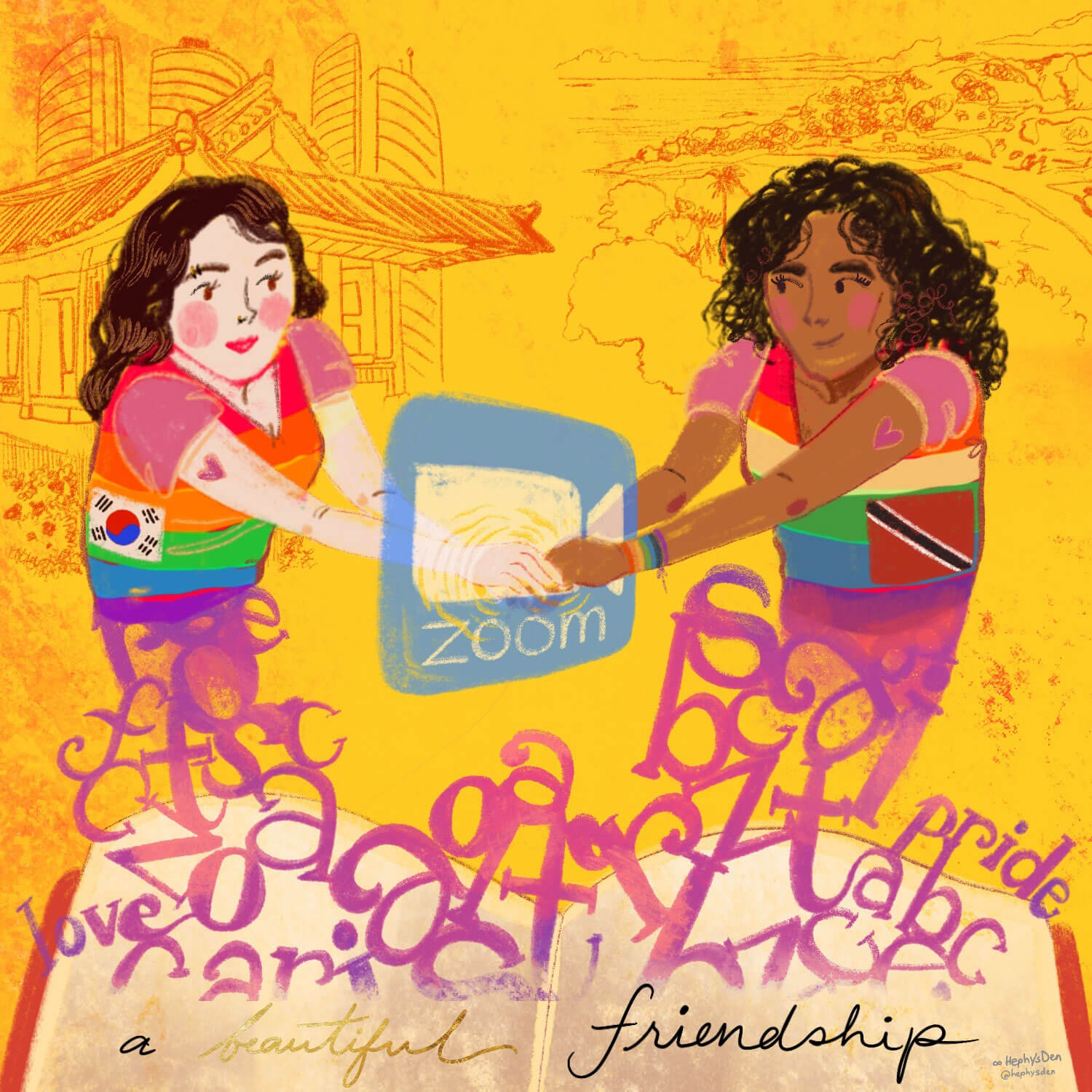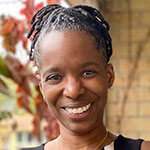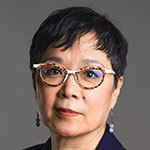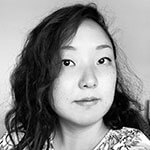
CW: Self-harm
(Su’s voice)
I can count on one hand the number of friends I have. I mean, I have a lot of friends. But the friends I am talking about are in a separate category. I have a friend from childhood who has experienced various stages of life with me. A friend who has become an extension of my family. A friend who was an oasis in my desert and became a sister. A friend who has gone through traumatic events together with me and survived. And most importantly, my partner, who knows and sees my soul from its most beautiful and glorious states to the lowly humiliating and traumatized ones and still holds me in her unwavering love.
It is not easy to be my friend. It takes years and then some. I built a well-practiced wall around my heart for protection. It takes time, like a well-worn pair of pants with ground-in dirt, holes, stretches, and color-fades. My friends stand the test of time with stickiness that won’t go away. So how did Alicia break through this protective wall in such a short time having only been in each other’s physical presence only once? What is the stuff of this friendship?
(Alicia’s voice)
My mother has a practice of swimming each morning. When I’m at home with her in Tobago, I marvel at the depth of darkness in the predawn sky. It is arresting. Its own kind of beauty. Walking the length of the beach, I usually don’t notice the moment that night becomes day. That shift from impenetrable sky to the morning’s warm yellow light permeating all things. One minute it’s not there and the next, it is: undeniable and full of promise. I think of this as a descriptor for my friendship with Su.
Our friendship feels like a sudden intimacy. What it truly is: a revelation. An unfolding practice that, like the break of dawn, has a precursor. A series of moments, intentions, and choices that encompass deliberate emotional risks. Unlike the breaking of dawn, ours was truly unanticipated, and still, an invitation to offer up yes to the possibility of entering into moments of transcendence.
The intention of setting aside the time, the place, and creating a container of holding and being held as we explored and shared our blueprints — those events that carved, chiseled, and matured us — felt like sacred ground upon which our divine selves witnessed each other.
How do you “know” someone in the midst of a pandemic? How do you know someone when you’re reluctant to reveal yourself? In so many ways, with Su, I felt like I didn’t have a choice. What my soul wanted was to be in an authentic relationship with her and for that to happen, every bit of me had to risk being known.
What are the gifts of a pandemic? Precious few, and this friendship with Su emerges as a profound one.
If you’ve ever been in the presence of someone who is unafraid of themselves and thus unafraid to truly see you — then you know that it is sacred and holy. The space between you is where the divine shows up fully. There grace abounds.
(Su’s voice)
When Alicia and I decided to write poetry in the spirit of Jacqueline Woodson’s brown girl dreaming, we did not know what to expect. We did not know what would flow from our pens (or our keyboards) and what stories yet to be remembered and told would find their way to our pages. We did not know how our relationship would transform from colleagues and acquaintances to friends, or whether that was even a conscious goal.
Initially, inspired by Woodson’s writing, I wanted to experiment with the craft of writing poetry from a particular time in my life from the voice and perspective of me in that particular time and space. The exercise of seeing (and writing) about a certain time in childhood, or youth, for example, through the eyes of the self at the time of that event can unblock the arteries of memory, compassion, and insight that have been hardened by the present-time frame that tends to read our present selves (and meaning) back into the past.
Together, we wrote of our lives through poetry. Every two weeks, we would explore the poems and spend about 90 minutes exploring every nook and cranny. Very often we would begin with, “tell me about the poem.” What led you to write it? What were you working through? And, what were you trying out in this artistic space? I experimented with alliteration for one of my poems. Alicia played with using tastes — sweet, salt, sour, bitter, and umami — as a way to frame her past relationships. The conversation stayed very focused on our poems and yet, we would be wading through the deep waters of our lives, past and present. I found myself being careful to stay within the tracks that were laid out by our poetry practice and not demand to know more about so many things in her life, about her sister, her father, her nephew, her partner, her life in the Air Force, her various relationships. As if we had a tacit agreement to stick with the poem and the lives revealed in and through the windows of the poem, I did not venture too far from that window. The picture of Alicia’s life that began to emerge was like a patchwork of emotions, events, and relationships that did not have a clear chronological nor a logical organizing frame.
The first several pieces of poetry that Alicia sent me were daring, bold, and full of raw emotions. She held back no punches. I wrote in an email to her after reading her poems, “Wow ... so powerful, full of rich palette of emotions.” She wrote of her (mostly) painful experiences of loss, marginalization, loneliness, and confusion. With her sharp knife-edged words shaped into delicate phrases, she seemed to exorcise the distaste, the bitter, the longings of her life. At times I wondered if she was testing me with the shrapnel pieces that littered her many pages of writing. I wondered if she was seeing if my container was strong enough, judgment-free enough, gentle enough, accepting enough to fully trust to hold her full and complexly emerging story.
I did not have the courage to ask her, “Are you testing me?” Instead, I said something like, “your writing has a lot of sharp parts and they can hurt. Do you write anything lighter? Can you write about a good relationship, not only bad ones?” I wonder now if she expected me to reject her, to run from her. What I do know is that I was given this incredible gift of a life delivered to me in the shape of a poem that was sacred to me. Sometimes the writings were so achingly beautiful — the construction, the word play, the rhythm and cadence, and the palpable wrestlings — that I would marvel and say, “How did she do that?” Her poems have the capacity to reveal the vulnerable amidst the broken-glass laden furious emotional landscape. Here is one that I really love.
• • •
The funny thing is,
I am secretly vain
I am stuffed with vanity
I know this because
I want to get to heaven with my breasts still perky.
I know — there’s something comical ... almost perverse
About that
and also
Impossible.
Let’s face it: gravity is definitely not on my side.
Never mind that heaven isn’t real and the two tattoos
I have guarantee that I’m not ascending with
My body unscathed, unscarred, and in mint condition.
But still,
It’s what I think about when I think about heaven.
That,
and
the scars on my left arm
made by my right hand and a razor
when words weren’t enough to express the pain
pulsing from the wounds unhealed inside of me
I remember the last time sitting in
my first car; that light blue chevy cavalier
four neat lines carved on my upper arm.
Blood beading,
... heart rate slowing,
... breath moving
back
to even again
Panic quietening when the opposite
Should have been happening.
I’ll go to God with these fading scars and say:
This is what I did when it felt like you left me
This is what I did to make it through
the next minute, next hour, next day.
And God will know that what I’m really saying is:
Forgive me, forgive me, forgive me. I was drowning.
Everything was too much then.
God will know that
what I really want is a chance to mourn
because I am still so ashamed that I failed myself
for not being strong enough
or courageous enough
or compassionate enough
or enough
and
I won’t have to say it, but God will know that what I need is
redemption
In the form of being held so close
that my heartbeat syncs with the rhythm of the Universe
and the music we make will remind me that
no matter what
I am perfectly formed
scars,
tattoos
sagging breasts (eventually)
and all.
19 Sept 2020

The Reverend Alicia Roxanne Forde serves with the Unitarian Universalist Association as the Director of the International Office. Alicia has a passion for engaging individuals and communities in discerning what they most care about and working alongside others as they seek to enact Love and Justice in this world. She has developed a profound appreciation for self-care, grounded leadership/organizational development, and the crucial importance of meaningful connections in establishing sustainable lives. Alicia was born and spent her formative years in Trinidad and Tobago. She identifies as a Black, queer, cis-gender woman with deep roots in Tobago. She considers herself bi-cultural and is grateful that her formative years enabled her to cultivate a global perspective. Alicia is a certified Spiritual Director and has a strong interest in health and wellness. When she's not hiking, you can find her reading, working-out, or podcast-walking. She is a graduate of The Iliff School of Theology (MDiv ’03) and currently lives with her partner and nephew in Longmont, Colorado.

Su Yon Pak (she/hers) is the Senior Director and Associate Professor of Integrative and Field-based Education at Union Theological Seminary, NYC. In this hybrid faculty-administrator position, she envisions, creates, and oversees the curricular and co-curricular work of field education, chaplaincy concentration, clinical pastoral education, ministerial formation, and combined courses inside Bedford Hills Correctional Facility. She is the co-author and co-editor of "Sisters in Mourning: Daughters Reflect on Care, Loss, and Meaning" (Cascade, 2021). She is interested in exploring the intersection of queerness and contemplative traditions as a spiritual director. Most importantly, she is a proud grandmother of Isobel and our grand puppy, Chara.

Pearl from Hephy's Den is a Licensed Creator and Artist from Miami, Florida. She is an ArtCenter College of Design alum and is currently active in both the United States and South Korea. You can find her on Instagram: @hephysden, or her personal website, hephysden.com.